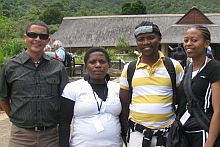A talent for nurturing young scientists
|
Nozipiwo (Nozi for short) Hambaze seems to be tailor-made for her new position as Education Outreach Officer at SAEON’s Elwandle Node.
Not only does she have a teacher's diploma, a weather observation certificate from South African Weather Services (SAWS) and a Gold Fields Environmental Education Certificate under her belt, but she has also gained extensive experience in environmental education outreach at the South African Institute for Aquatic Biodiversity (SAIAB), host organisation to SAEON’s Elwandle Node.
Nozi is quick to confess that she has found her niche in the natural environment. "I love mingling with the universe and exploring different aspects of nature," she says.
Children is another of her passions. She left the formal teaching profession to pursue her talent for working with children in the "living classroom" of nature. She is also passionate about entrenching these life-enriching lessons into the school curriculum, and has compiled several worksheets for educators in support of the curriculum.
Her experience at SAWS where she not only hosted in-house groups but was involved in scientific activities such as measuring sea temperature and doing hourly weather observations, has primed her for her task at the Elwandle Node where she will be working closely with five high schools in Grahamstown on whose premises weather stations have been constructed by the Node.
Nozi will be instrumental in executing programmes in which learners track data for their school on a continuous basis and record daily variations in wind speed and direction, air pressure and humidity. The learners are taught to interpret, analyse and generate information from quantitative measurements, which can be easily integrated across all learning areas in a school syllabus.
This programme has been one of the major incentives for Nozi to join SAEON. "Weather is everyone’s concern," she says, "and it is interesting to see how it changes from day to day, and varies on local, regional, and global spatial scales. The learners are fascinated by the changing weather patterns."
Long-term monitoring programmes
Nozi says that she will be drawing on the natural curiosity of the learners to assist them in acquiring those vital scientific enquiry abilities listed as a priority in SAEON’s education outreach strategy. Although she will initially be focusing on weather monitoring in Grahamstown, she also intends including other long-term monitoring programmes - such as for global warming - in her education outreach programmes as time progresses. This will not only give learners a better understanding of global warming and its impacts, but will also assist them in developing innovative adaptation measures.
Two other opportunities to nurture young scientists and promote science careers that Nozi is looking forward to are Marine Biosciences Month and National Marine Month. As assistant to SAIAB’s Senior Education Officer Gaji Magajana, she has worked closely with her predecessor at the Elwandle Node, Dumile Tshingana, in planning and executing these programmes over the past two years. Nozi and Dumile also participated in a drama highlighting the impacts of climate change at the Marine and Coastal Educators Network (MCEN) conference in East London in 2008.
One of Nozi’s concerns is schools in rural areas, which do not always get the educational support they need. She is considering actions to involve these schools in her programmes. But for now Scifest Africa , which will be held in Grahamstown in March, is her most immediate concern and she is preparing to present two learner workshops entitled 'Collecting long-term data: Coastal influence on our climate'.
While employed at SAIAB, a facility of the National Research Foundation (NRF), Nozi was voted the person who best embodied the NRF values of world-class service, respect, people-centred, accountability, passion for excellence, and integrity.
SAEON is looking forward to having Nozi’s sterling qualities contribute towards its objective of channeling more of South Africa’s bright young pupils into the country’s science system.












